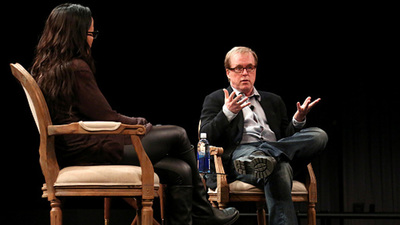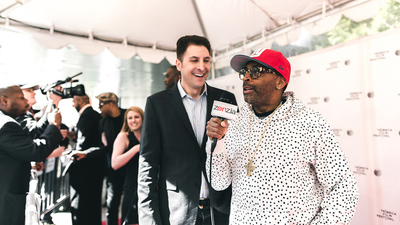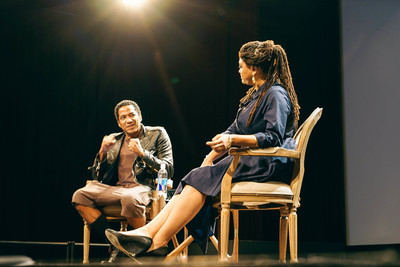
BY MATT BARONE |
Ava DuVernay & Q-Tip Discuss Black Cinema, A Tribe Called Quest, and More at TFF 2015
Unlike other Tribeca Talks events, this one felt less like an interview and more like a spirited chat among pals. DuVernay included Q-Tip in many of her answers, even asking the legendary rapper a few of her own.

PHOTO BY @ericveloso
Scheduled to start at 1 p.m., the Tribeca Talks®: Directors Series event with Selma director Ava DuVernay and guest interviewer Q-Tip didn’t initially go as planned. A few minutes after 1 o’clock, the crowd inside the SVA Theatre heard the not-so-great news: DuVernay’s red-eye flight from her home city of Los Angeles had been delayed, pushing her time table back a bit; complicating the situation even further, her cab driver, as many New York City taxi navigators tend to do, decided to take the scenic route to the venue. All told, DuVernay didn’t arrive until 20 minutes after the announced start-time.
You got the sense, though, that everyone in the building would’ve gladly waited another hour for her. She’s that special.
A sad rarity in the Hollywood movie business, DuVernay is a black woman filmmaker who’s successfully been able to make a big studio movie, last year’s Oscar-nominated Selma, an alternately intimate and powerful depiction of Dr. Martin Luther King, Jr.’s steadfast work in securing voting rights for black Americans in 1965. Selma wasn’t the LA native’s first directorial rodeo, however—before shooting that exceptional film for Paramount Pictures, DuVernay blazed her way through the indie film scene, directing two homegrown narrative features, I Will Follow (2011) and Middle of Nowhere (2012), and a pair of documentaries, This is the Life (2008) and the Venus Williams doc Venus Vs. (2013) for ESPN Films. And next up for DuVernay is the television pilot For Justice, produced by Tribeca Film Festival co-founder Jane Rosenthal.

PHOTO BY @ericveloso
Not that anyone inside the SVA needed to know all of that. The great thing about DuVernay’s Tribeca Talks® conversation with Q-Tip—he of all-time hip-hop royalty and the seminal NYC group A Tribe Called Quest—was the room’s easygoing, we’re-all-family mood. Though they’d only met for the first time two minutes before taking the stage, DuVernay and Q-Tip got along like old friends, their natural rapport stemming from their mutual adoration for one another; DuVernay, a lifelong self-proclaimed hip-hop head has been a fan of Tip’s since Tribe’s early records, namely their 1993 album Midnight Marauders, which she enthusiastically shouted out as a personal favorite.
Unlike other Tribeca Talks events, this one felt less like an interview and more like a spirited chat among pals. Rather than waiting for questions and then directly responding, DuVernay included Q-Tip in many of her answers, even asking the legendary rapper a few of her own. Late into the convo, DuVernay discussed her on-set working process: “You’re directing an experience—it’s like throwing a house party,” a charming way of saying that she emphasizes good times and treats everyone with the same amount of respect, from the key grips all the way up to the movie stars. In a nice bit of subtle namedropping, Q-Tip recalled the time when he visited his buddy “Leo” (short for Leonardo DiCaprio) on the set of Django Unchained was taken aback by how light director Quentin Tarantino kept everything, playing James Brown tunes between takes and toasting margarita drinks with his colleagues.
The on-stage chemistry also made its way into DuVernay’s own personal fandom. After Tip praised DuVernay’s films for depicting black people in a much-needed positive light, he mentioned that he tries to have his music “show and highlight black excellence but also black complexities.” DuVernay immediately replied with a question about Tip’s personal views on today’s rap music climate. His retort: “Some people who have the chops and wherewithal to make more meaningful music decide to pay the bills,” by dumbing their records down and lazily talking about money, “bling,” and other superficial vices. None of which ever crept into Q-Tip’s music with A Tribe Called Quest, a group that always remained socially conscious throughout their historic five-album run. Without ATCQ, frankly, we wouldn’t have artists like Common and Kanye West.
Seizing the moment, DuVernay bluntly asked Tip, “Could Tribe come out now and hit?” With barely a full pause, his honest response was, simply, “No.” SEE VIDEO OF THIS MOMENT ABOVE
Which led into a discussion about artistic longevity, and how the longstanding productivity of a music artist like Q-Tip is uncommon for black filmmakers trying to sustain relevance in the movie industry. “To say you’re a fan of black filmmakers is to say you’re a fan of two or three films,” said DuVernay, after referencing influential but oft-neglected black directors like Julie Dash and Charles Burnett. “We don’t have a Woody Allen, or a Mike Nichols.” The one exception is one of DuVernay’s biggest inspirations, Spike Lee, who’s amassed a staggeringly long and diverse filmography through sheer determination and little interest in others’ opinions. “My motto is, ‘Stay shooting’—I would tattoo that, but my mama says, ‘No more tattoos,’” quipped DuVernay. “One of the things I’ve learned from Spike is to stay shooting and to keep working.”

PHOTO BY @stevesweatpants
Her full M.O. runs even deeper than that. “What my mission is in all of my work, truly,” she told Q-Tip, “is to magnify the magnificence of black people.” Part of that is paying close attention to every single detail, right down to how she and her regular cinematographer, fellow African-American filmmaker Bradford Young, shoot black characters and frames them with lighting.
With her film Middle of Nowhere, for example, “We were playing with the idea of how black people look in dark rooms. I was thinking about going home and the lights are off, and how do I look in that room?” In Selma, there’s a scene where MLK (played by David Oyelowo) and fellow civil rights activist Ralph Abernathy (Colmon Domingo) are in a dark, grungy jail cell, an image that fed into DuVernay’s focus on “deconstructing the black body,” and thinking of a poorly lit, 1960s Alabama prison cell as if it were “the hull of a slave ship.”
Nuggets like that certainly struck many chords with the black filmmaking hopefuls inside the SVA, many of which praised DuVernay for allowing them to see themselves—minorities looking to tell stories in a medium that’s sadly lacking in diversity—in her.
One young woman asked DuVernay how she’s able to navigate the “male-dominated” game as both a woman and a woman of color, two characteristics that make DuVernay a needle in cinema’s masculine haystack. She reasoned that her previous career, that of a film publicist, helped her see the struggles firsthand before entering the behind-the-camera profession, and also gave her confidence. “Because I started in another career first, and then I went into this career, I already had a little ‘Fuck you’ in me,” she said, triggering much-welcomed applause from the audience. “I just don’t embrace the ‘man’ thing as being a block. It is not possible that you’re gonna stop me from making my thing.” Further applause.
“I intend to be with a cane yelling ‘Action!’” DuVernay proclaimed, in closing. “I look forward to that. I hope I can make it there.”
Barring any insurmountably long red-eye flight delays, that future seems inevitable. And very necessary.
To feel the great and empowering energy that was in the room, watch exclusive footage of Ava DuVernay and Q-Tip’s hour-long conversation coming to tribecafilm.com soon.
Tribeca Film Festival videos are shot on equipment provided by Adorama Rental Co.

